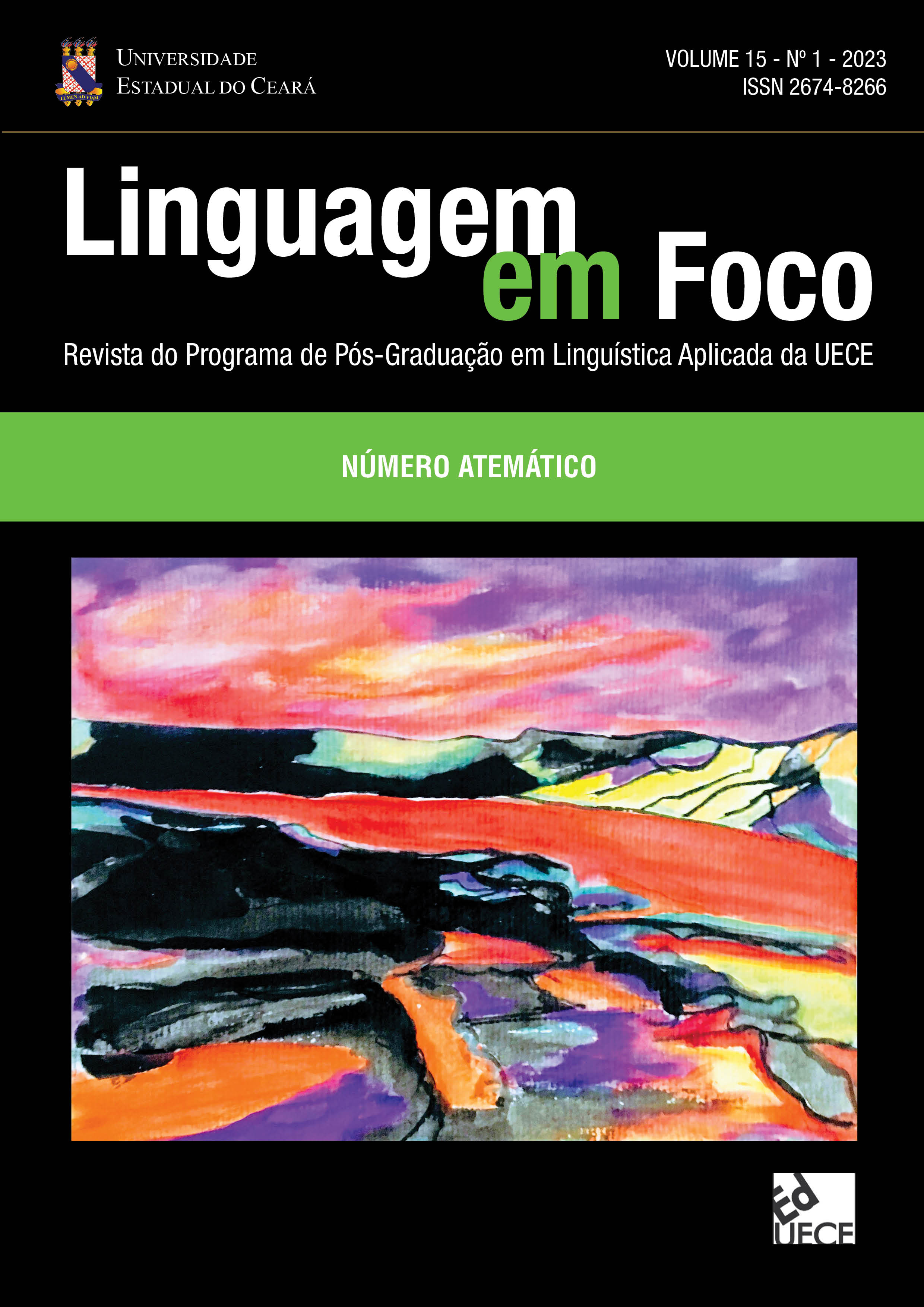Fanfics corporativas
O discurso humorístico como estratégia de resistência diante da racionalidade neoliberal
DOI:
https://doi.org/10.46230/2674-8266-15-7478Palavras-chave:
Humor, Discurso, Mídia digital , Racionalidade neoliberalResumo
O objetivo deste estudo consiste em analisar como os discursos humorísticos materializados em postagens e comentários do grupo Fanfics corporativas se constituem como estratégias de resistência diante da racionalidade neoliberal, pois parodiam, satirizam e tornam risíveis práticas e condutas concernentes ao campo empresarial e corporativo e, por extensão, ao paradigma neoliberal. O aparato teórico que norteia esta investigação repousa nos postulados de Foucault (2008; 2010), de Dardot e Laval (2016) e de Possenti (2010). A metodologia segue uma perspectiva descritivo-interpretativa de natureza qualitativa. O corpus compreende quatro postagens e vinte comentários publicados no grupo Fanfics corporativas em dezembro de 2021. As análises atestam que os recursos linguístico-discursivos mobilizados para a construção do humor, como a paródia e a ironia, constituem estratégias de resistência em relação às vontades de verdade da racionalidade neoliberal, pelo fato de inserirem os discursos vinculados a tal racionalidade no esteio da fantasia, da fabulação e da ficção, destituindo-os de certa confiabilidade.
Downloads
Referências
BAGNO, M. Falsas elegâncias: como evitar a hipercorreção na escrita formal. São Paulo: Parábola, 2020.
BAKHTIN, M. A cultura popular na Idade Média e no Renascimento: o contexto de François Rabelais. Trad. Yara Frateschi Vieira. São Paulo: Hucitec; Brasília: Editora da Universidade de Brasília, 2008.
BARBOSA, I. V.; FISTAROL, C. F. S.; ROEPKE, J. L. Reflexões sobre linguagem e tradução em contextos de scanlation e fanfics, Organon, Porto Alegre, v. 35, n. 68, p. 1-17, 2020. DOI: https://doi.org/10.22456/2238-8915.99879
BURKART, M. De Satiticón a Hum®: risa, cultura y política en los años setenta. Buenos Aires: Miño y Dávila Editores, 2017.
CASAQUI, V.; MATIJEWITSCH F.; FIGUEIREDO, C. B. S. Empreendedorismo, infância e celebridades: análise dos discursos do empreendedorismo para crianças, Intexto, Porto Alegre, n. 44, p. 99-119, jan./abr. 2019. Disponível em: https://www.seer.ufrgs.br/intexto/article/view/78062/49892. Acesso em: 19 dez. 2021. DOI: https://doi.org/10.19132/1807-8583201944.99-119
CASTRO, G. H. C.; SIQUEIRA, M. V. S. “Vão achar que é uma piada, mas, para nós, não”: discursos de resistência em clubes brasileiros de futebol gay, Cadernos EBAPE BR, Rio de Janeiro, v. 18, n. 4, p. 1058-1070, out./dez. 2020. Disponível em: https://bibliotecadigital.fgv.br/ojs/index.php/cadernosebape/article/view/82707. Acesso em: 16 dez. 2021. DOI: https://doi.org/10.1590/1679-395120200097
DARDOT, P.; LAVAL, C. A nova razão do mundo: ensaios sobre a sociedade neoliberal. Trad. Mariana Echalar. São Paulo: Boitempo, 2016.
FIGUEIREDO, D. O. Humor e resistência: as possibilidades políticas do humor nas charges do jornal O Pasquim. 2012. 100 f. Dissertação (Mestrado em Comunicação) – Centro de Educação, Comunicação e Artes, Universidade Estadual de Londrina, Londrina, 2012.
FOUCAULT, M. Foucault: uma trajetória filosófica para além do estruturalismo e da hermenêutica. Trad. Vera Porto Carrero. Rio de Janeiro: Forense Universitária, 1995, p. 231-250.
FOUCAULT. M. Ditos e Escritos IV: Estratégia, Poder-Saber. Rio de Janeiro: Forense Universitária, 2006.
FOUCAULT, M. O nascimento da biopolítica: curso dado no Collège de France: (1978-1979). Trad. Eduardo Brandão. São Paulo: Martins Fontes, 2008.
FOUCAULT, M. A ordem do discurso. 19. ed. Ed. M. J. Marcionilo. São Paulo: Edições Loyola, 2009.
FOUCAULT, M. A arqueologia do saber. Trad. Luiz Neves. Rio de Janeiro: Forense Universitária, 2010.
HAN, B. C. Sociedade do cansaço. Trad. Enio Paulo Giachini. Petrópolis, RJ: Vozes, 2015.
HAN, B. C. Psicopolítica: o neoliberalismo e as novas técnicas de poder. Trad. Maurício Liesen. Âyiné: Belo Horizonte, 2018.
MINOIS, G. História do riso e do escárnio. Trad. Maria Helena O. Ortiz Assumpção. São Paulo: Editora da UNESP, 2003.
MIRA, M. C. Circo eletrônico: Sílvio Santos e o SBT. São Paulo: Edições Loyola, 1994.
MUNIZ, C. R. Poder e humor em tempos de pandemia: as deepfakes de Bruno Sarttori, Revista do Gelne, Natal, v. 23, n. 9, p. 60-70, jun. 2021. Disponível em: https://periodicos.ufrn.br/gelne/article/view/24769. Acesso em: 15 dez. 2021. DOI: https://doi.org/10.21680/1517-7874.2021v23n2ID24769
POSSENTI, S. Humor, língua e discurso. São Paulo: Contexto, 2010.
RECUERO, R. Introdução à análise de redes sociais on-line. Salvador: EDUFBA, 2017.
RODRIGUES, J. Movimento anticoach nas redes faz alerta sobre positividade tóxica no trabalho, O Estado de São Paulo, São Paulo, 5 dez. 2021. Disponível em: https://economia.estadao.com.br/noticias/sua-carreira,movimento-anticoach-nas-redes-faz-alerta-sobre-positividade-toxica-no-trabalho,70003916265. Acesso em: 10 dez. 2021.
RUIZ, M. A. A.; ARAÚJO, L. M. B. M.; MANZANO, L. C. G. O humor em (dis)curso: efeitos do feminismo nas mídias digitais, Cadernos de Estudos Linguísticos, Campinas, v. 63, p. e021018, 2021. Disponível em: https://periodicos.sbu.unicamp.br/ojs/index.php/cel/article/view/8662018. Acesso em: 18 dez. 2021. DOI: https://doi.org/10.20396/cel.v63i00.8662018
SAFATLE, V. A economia é a continuação da psicologia por outros meios: sofrimento psíquico e neoliberalismo como economia moral. In: SAFATLE, V.; SILVA JUNIOR, N.; DUNKER, C. (orgs.). Neoliberalismo como gestão do sofrimento psíquico. Belo Horizonte: Autêntica, 2021. p. 11-38.
STANDING, G. O precariado: a nova classe perigosa. Trad. Cristina Antunes. Autêntica: Belo Horizonte, 2020.
VILELA, A. Trem-Bala. Disponível em: https://www.letras.mus.br/ana-vilela/trem-bala/. Acesso em: 10 dez. 2021.
Publicado
Como Citar
Edição
Seção
Licença
Copyright (c) 2023 Francisco Vieira da Silva

Este trabalho está licenciado sob uma licença Creative Commons Attribution 4.0 International License.
Os autores que publicam na Linguagem em Foco concordam com os seguintes termos:
- Os autores mantêm os direitos autorais e concedem à revista o direito de primeira publicação. Os artigos estão simultaneamente licenciados sob a Creative Commons Attribution License que permite a partilha do trabalho com reconhecimento da sua autoria e da publicação inicial nesta revista.
- Os conceitos emitidos em artigos assinados são de absoluta e exclusiva responsabilidade de seus autores. Para tanto, solicitamos uma Declaração de Direito Autoral, que deve ser submetido junto ao manuscrito como Documento Suplementar.
- Os autores têm autorização para disponibilizar a versão do texto publicada na Linguagem em Foco em repositórios institucionais ou outras plataformas de distribuição de trabalhos acadêmicos (ex. ResearchGate, Academia.edu).





























